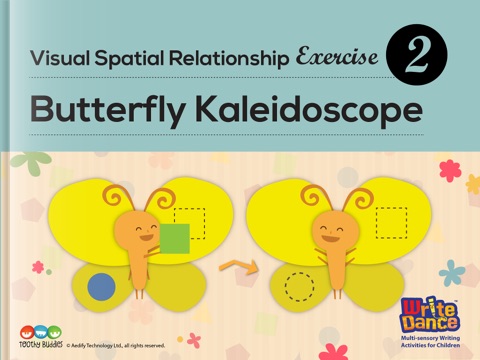
Visual Spatial Relationship Exercise: Butterfly Kaleidoscope
Butterfly Kaleidoscope is one of the visual perceptual learning materials from ""Write Dance: Multi-sensory writing activities for children"". These practices provide children with training on eye movements, develop their directional and spatial perceptions, and stimulate their visual recognition skills. Parents and teachers will be provided with learning records and performance reports to monitor the children’s learning progress.
When teaching children to write, accuracy and legibility are the two prerequisites. To write neatly without compromising the writing speed, the hands have to coordinate with the eyes and minds! “Butterfly Kaleidoscope” is an activity based on visual-spatial relationships, in which the children get familiarized with the spatial relationship between two or more objects. This enhances their spatial judgment and helps them to write neat Chinese characters with correct arrangements of the components. In addition, this exercise is helpful in the following ways:
• Distinguishing the positions of left and right, top and bottom, inside and outside
• Avoiding mixing up the positions of the left and right components, for example, the Chinese characters (部) and (陪)
• Helping children to grasp the proportion of the components in Chinese characters, for instance, 1:1 proportion (林 -wood), one-third proportion (樹- tree), or even differences in length and width(棍- rod)
• Good spatial perception skills help with keeping handwriting within boxes or on straight lines.
• Every day, we draw on spatial perception skills when estimating certain areas, finding our way and remembering how to get places.
A Chinese character is composed of a number of components. By working on the spatial relationship in the activity, children are prepared to grasp the structure of Chinese characters, and eventually to write with accuracy and legibility. In the activity designed for advanced players, the butterfly wings increase in number from 4 to 6. More shapes, and more similar shapes, are given for the children to deal with. They also have a shorter time to finish the tasks too!
Do you want to know if your child is making progress? We are here to provide detailed records and analysis on the child’s learning performance. So, don’t worry! Relax and enjoy these activities with your child! Which one of you will get a higher score is anybody’s guess!
We use automatic adapted exercises!
Butterfly Kaleidoscope is one of our automatic adapted exercises. In other words, the level of difficulty of the exercise is adjusted automatically based on the children’s capacities and their performance. Therefore, the children will not find the practice too easy and get bored, nor will they feel frustrated because of how demanding is it. Unlike the paper exercise books we have today, the content of the automatic adapted exercise is tailor-made for each child according to the child’s learning progress and aptitude, promoting independent and individual learning.
There’s a time limit!
How much time does it buy you by saying “Just one more go”? The answer is probably different for the children and parents! To the participants, “5 minutes” is nothing; to those who are waiting, “5 minutes” is more than enough. Seeing the parents and their children fighting over the use of electronic gadgets is the last thing we want, because after all, we advocate children to learn with fun! Hence, we suggest that before doing the activities, parents and children agree on a time limit for the activity. Once the time is up, the children should take a 30 minute break before working on the activity again.



